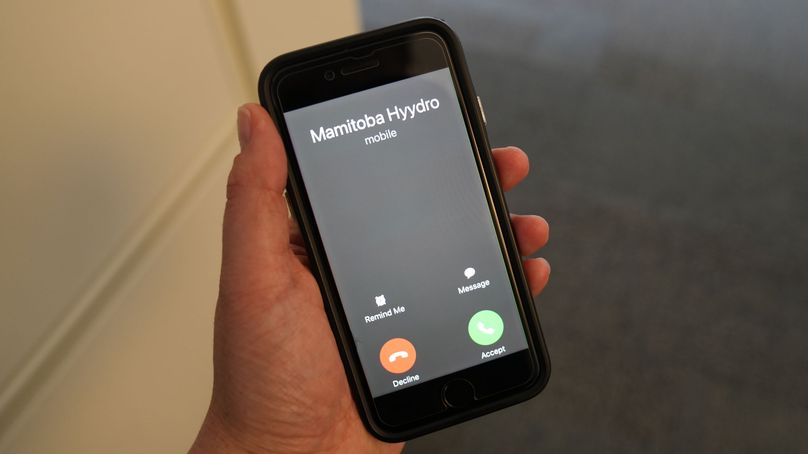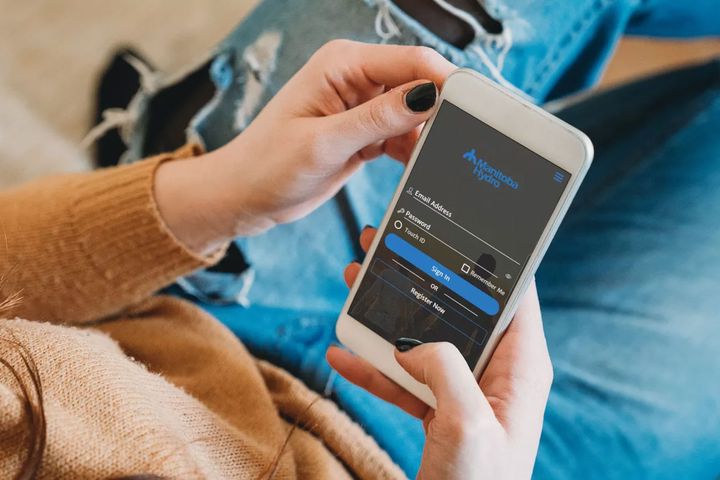Recently on a Friday afternoon, one of Louise Nowak’s employees told her there was someone from Manitoba Hydro on the phone with an urgent message, and handed the phone to her.
The voice on the other end told Louise that Supper Central’s power would be shut off in 45 minutes if she didn’t pay her bill immediately.
Louise knew right away it was a scam.
“I know I wasn’t in arrears, and I knew Hydro doesn’t call like this,” said Louise. “I don’t even think it’s legal to shut down power that quickly. But they did seem more polished than your average scammer.”
When she made her suspicions clear, the caller asked if she was OK to wait to hear it from their manager. Louise told them sure; she could wait – she was on hold with the real Manitoba Hydro on another line to verify the call.
Supper Central is a Winnipeg business that sells prepared meals, and they have many fridges and freezers. Scammers target independent businesses like this with threats to cut power at peak times since they know it could be financially catastrophic.
Louise hung up and reported the call to us.

Louise Nowak saw through a scam to her business, Supper Central.
Enlarge image: Business owner Louise Nowak at Supper Central.
Unfortunately, scams like this aren’t new. Scammers pretend to be Manitoba Hydro via phone calls, emails, texts, and even door-to-door. Phone and email scams are the most common.
Supper Central wasn’t the only business to be targeted that day or report it to us.
Once we knew, our social media team created Facebook and Twitter posts to remind customers to watch out. Scams come in waves. And go away as soon as they get any publicity.
The trend appears to be that scammers are using the phone less and less. In 2018 and 2019 respectively, 407 and 396 scammer phone calls and texts were reported, while between 2020 and 2022, there have been fewer than 40 phone scams reported each year.
One reason for that is customers are smarter and hang up immediately without reporting it to us.
Conversely, the number of reported scam emails is going up, from only two reported in 2018 to already 36 so far in 2023. These emails are aimed at convincing customers to make a bill payment or supply personal banking information to get a rebate.
“With scammers becoming increasingly more sophisticated, it makes it harder for the utility’s customers to tell the difference between scams and legitimate messages,” said Chris McColm from our corporate security team.
Scammers use ‘spoofing’ to mislead customers, meaning they can rig caller ID and modify the sender address in an email, making it look like the communication is from us, and mimic our automated phone system.
Tricksters tend to target small businesses on busy days, and they are especially active during busy seasons like Christmas when people aren’t paying as much attention, or when a new employee is likely working.
Here’s are some tips you, your family and your employees should know.
It’s a scam if:
- The caller/email/text/person threatens near-immediate disconnection. We do not make one-time, last-minute threats.
- They request a particular payment method. We never specifically ask for prepaid debit cards, payments over the phone, wired money, and certainly not cryptocurrency.
- They offer to restore power right after a payment.
- They get impatient or frustrated if you didn’t give them what they want right away.
But yes, we DO:
- Make reminder phone calls to customers requesting payment to prevent disconnection of service, but these reminders are never last-minute, one-time threats. Customers with delinquent accounts receive an advance disconnection notification, usually by mail and included with the regular monthly bill.
- Offer a variety of payment methods. You can also securely mange your account online or by downloading the mobile-friendly Manitoba Hydro app.
What you should do:
- If you get any communication claiming to be Manitoba Hydro and demanding immediate payment through an unfamiliar method, do not respond — hang up, delete the message, or shut the door.
- Never, ever give out your personal banking or credit card information.
- Report scams on our website: Report frauds & scams.
- Call us at 1-888-624-9376 or message @manitobahydro on Facebook, Twitter, or Instagram to tell us about it.
If you ever feel you are in danger, call 911. You can also contact the Canadian Anti-Fraud Centre at www.antifraudcentre.ca.
Manitoba Hydro is a member of Utilities United Against Scams (UUAS), an association of over 150 U.S. and Canadian electric, water, and natural gas companies and their respective trade association that raises awareness of scams to protect customers.




